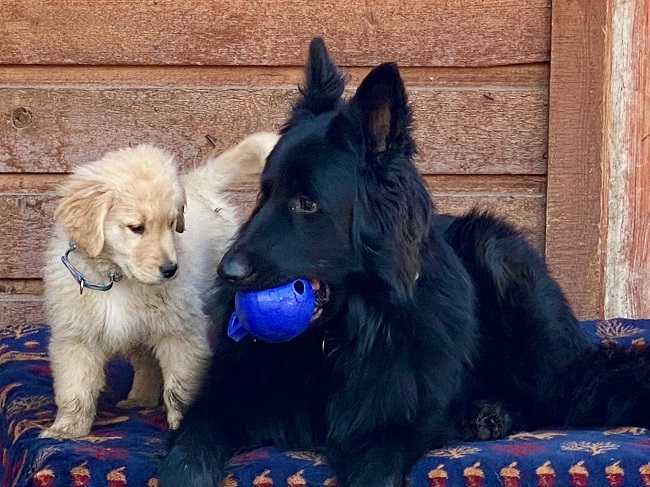
BY FRAN JEWELL
It has long been thought that if a dog is shy or even fearful, you should get that dog out and expose it to more social situations. If your dog is afraid of people, it should see more people. If your dog is afraid of dogs, it should be exposed to more dogs.
The proper time for socialization is very early in a puppy’s life. The best time is up to about 16, maybe 18, weeks. During that time, we imprint events and good behaviors (this is one reason it is so critical to do training, too, at this time and not wait until the puppy is six months old). Notice what I said here: we imprint events during that time. So if your puppy is exposed to an extremely bad event, such as a dog attack, or someone that kicks your puppy, your puppy will most likely remember that event for the rest of its life.
How your puppy responds to that is influenced a great deal by what your puppy’s genetic temperament is. A puppy with a strong and stable temperament probably is not going to be too heavily influenced. I see puppies all the time that have had horrible beginnings, but come out smelling like a rose. A puppy with a little less confidence can be devastated by a bad event. And sometimes, if you have an older puppy that is fearful, it is hard to know if the puppy has a genetically fearful behavior or one that was influenced by a bad event at a crucial time.
During this critical time, it is important to be very selective about where you take your puppy and who your puppy is exposed to, both human and canine. Socialization is critical, but it is also critical that you not expose your puppy to a bad situation. You must make decisions about who your puppy plays with and where your puppy goes. This is not the time to be cavalier about socialization.
The second most important time to avoid socialization is when an older dog has nipped or bitten. It has long been thought that if a dog is afraid and has attempted to bite or has nipped, exposure to more of those things will help your dog to overcome its fear. Instead, what is imperative is that your dog not be continually exposed and feel the constant rush of hormones released during an event that scares it. Many of those hormones stay in your dog’s body for several weeks. If your dog continues to be exposed and continues to be afraid, it may experience an overload of hormones in its system. This can only continue a vicious cycle of more fear.
It is also important to consider that if a dog has used its mouth to nip or bite initially, not only is the dog a danger to other people and dogs, it is likely that the more the dog is exposed, the more it will practice that behavior and begin to rely on that behavior to solve any problem.
Dogs that are afraid and even threaten to bite or nip need to learn new skills first, and then gradually be exposed during a controlled desensitization period that has successful outcomes. This is best to do with a trained and experienced professional.
Before you jump into any behavior modification programs, please, get advice from someone that is qualified. Information on the Internet will be conflicting and not necessarily accurate for your dog. And remember that socialization is not always the cure!


